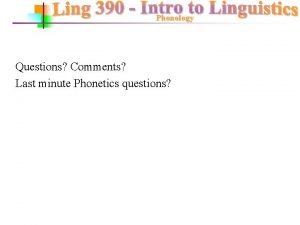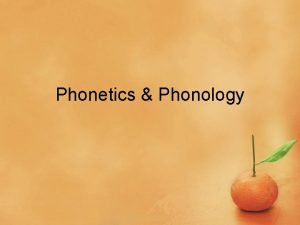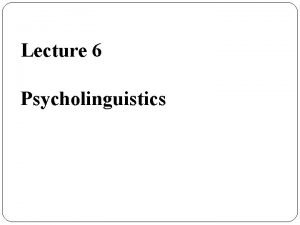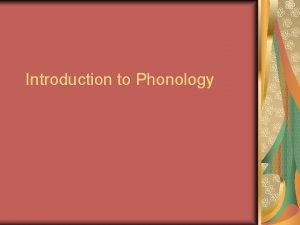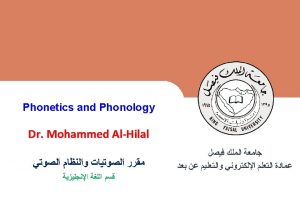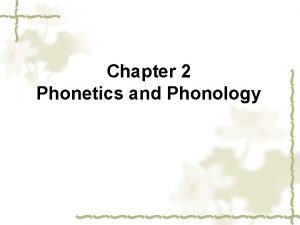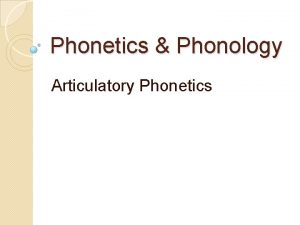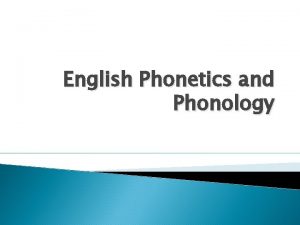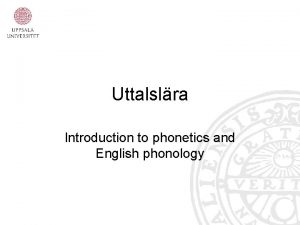ENGLISH PHONETICS AND PHONOLOGY SESSION 11 RIKA MUTIARA













- Slides: 13

ENGLISH PHONETICS AND PHONOLOGY SESSION 11 RIKA MUTIARA, S. Pd. , M. Hum. PENDIDIKAN BAHASA INGGRIS, FKIP

Learning Outcomes • Students are able to analyze stress in complex words.

What are complex words? • Words which are made from a basic stem word with the addition of an affix (prefixes and suffixes). • Compound words which are made of two (or occasionally more) independent English words ice cream armchair

Affixes • The affix itself receives the primary stress. semicircle personality • The word is stressed just as if the affix was not there. pleasant unpleasant marketing • The stress remains on the stem, not the affix, but it is shifted to a different syllable magnetic

Affixes • The most common, the primary stress is on the 1 st syllable of the suffix. If the stem consists of more than 1 syllable, there will be a secondary stress on 1 of the syllables of the stem. This cannot fall on the last syllable of the stem. If necessary. It is moved to earlier syllable japanese

Suffixes that do not affect stress placement (Adjective) • • -able -age -al -en -ful -ing -ish comfort anchor refuse wide wonder amaze devil comfortable anchorage refusal widen wonderful amazing devilish

Suffixes that do not affect stress placement • • -like -less -ly -ment -ness -ous -fy -wise bird power hurried punish yellow poison glory other birdlike powerless hurriedly punishment yellowness poisonous glorify otherwise

The suffixes • In single-syllable stem, the stress is almost always placed on the stem. • When the stem has 2 syllables, the stress is sometimes on the first and sometimes on the second syllable of the stem. If the final syllable of the stem contains a long vowel or diphthong, or it ends with more than one consonant, that syllable receives the stress. importance

Prefixes • Stress in words with prefixes is governed by the same rules as those for words without prefixes.

Compound words • The most type of compound is the one with contains 2 nouns and normally has the stress on the 1 st element. typewriter sunrise suitcase tea-cup • Compounds with an adjectival first element and the – ed morpheme at the end have this pattern. bad-tempered half-timbered heavy-handed

Compound words • Compounds in which the 1 st element is a number in some form tend to have final stress head-first north-east down-stream • Compounds which function as verbs and have an adverbial first element take final stress down-grade back-pedal illtreat

Stress Variation • Stress position may vary because of other words occurring next to the word. bad-’tempered a ‘bad-tempered ‘teacher half-’timbered a ‘half-timbered ‘house

Word-class pairs • Two-syllable words with identical spelling which differ from each other in stress placement, apparently according to word class (N, V, and Adj). • The stress will be placed on the 2 nd syllable of the verb but on the 1 st syllable of the N or Adj. abstract (Adj, V) conduct (N, V) contract (N, V) import (N, V) insult (N, V) present (N, Adj , V) protest (N, V)
 Phoneme definition
Phoneme definition Difference between phonetics and phonology
Difference between phonetics and phonology Questions about phonology
Questions about phonology Phonetics and phonology
Phonetics and phonology Introduction to english linguistics exercises answers
Introduction to english linguistics exercises answers Difference between phonetics and phonology
Difference between phonetics and phonology Difference between phonetics and phonology
Difference between phonetics and phonology Introduction to general phonetics and phonology
Introduction to general phonetics and phonology What is the difference between phonetics and phonology
What is the difference between phonetics and phonology Secondary vowels
Secondary vowels Phonetics and phonology
Phonetics and phonology Complementary distribution examples
Complementary distribution examples S phonetic alphabet
S phonetic alphabet Coasta rika
Coasta rika


